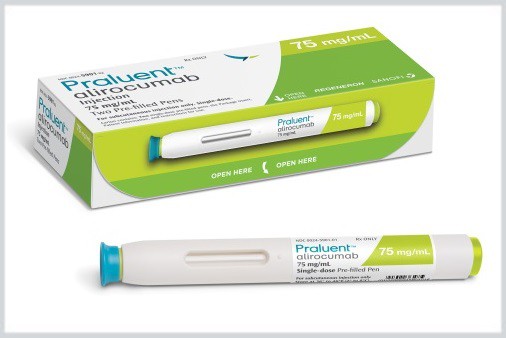
The EU has approved a cardiovascular outcomes claim for Sanofi’s cholesterol-lowering antibody Praluent, finally setting it on par with rival Repatha from Amgen.
The European Commission cleared Praluent (alirocumab) to reduce cardiovascular risk in adults with established atherosclerotic cardiovascular disease (ASCVD), almost a year after Amgen got the green light to include its own outcomes claim on the Repatha (evolocumab) label.
Praluent may have won approval later, but analysts have suggested that the results of the ODYSSEY OUTCOMES trial which have supported the EU approval are stronger than Amgen’s FOURIER trial, and could lead to a fightback for Sanofi’s drug, which is partnered with Regeneron.
The ODYSSEY trial showed a 15% benefit in mortality in patients, while FOURIER showed that Repatha reduced heart attack risks by 27%, stroke risks by 21% and coronary revascularisations by 22% – but couldn’t provide a mortality benefit.
Amgen has just announced a new four-year outcomes study called VESALIUS-CV that will try to bolster its dataset for Repatha. The study will enrol 13,000 patients worldwide at high risk of experiencing a first cardiovascular event, despite ongoing cholesterol-lowering therapy.
The two PCSK9 inhibitors are locked in a battle for the severe, high-risk end of the cholesterol market – mainly patients who are unable to control low-density lipoprotein (LDL) cholesterol levels using statins alone – although both have been held back by payer resistance that have forced steep price cuts.
Sanofi booked €250m from Praluent last year, up 54%, while Regeneron said it made $181m from the drug. Meanwhile, Amgen recorded a 72% gain in Repatha sales to $550m in 2018. Despite the slow start and price reductions analysts now think both products could eventually reach blockbuster sales, fuelled by the outcomes data which led to FDA approvals for Repatha at the end of 2017 and for Praluent last year.
Both Praluent and Repatha were launched a couple of years ago with a list price of around $14,000 a year, but are now being offered in the US for considerably less – at $5,850 apiece according to Bloomberg – to try to secure exclusivity on payer formularies.
Complicating the picture is a global intellectual property battle going on between Amgen and Sanofi/Regeneron over the PCSK9 inhibitor patent estate, with recent decisions in Germany and the US favouring Amgen and heading for the appeals process.
“Many patients with atherosclerotic cardiovascular disease often struggle to control their high LDL-cholesterol levels, despite lifestyle modifications and treatment with statins, and some have already experienced cardiovascular events,” said Sanofi’s head of R&D John Reed.
“These patients could face a higher risk of another life-threatening cardiovascular event, and Praluent’s new indication in Europe offers a risk-reduction focused lipid-lowering treatment option to physicians and patients.”




